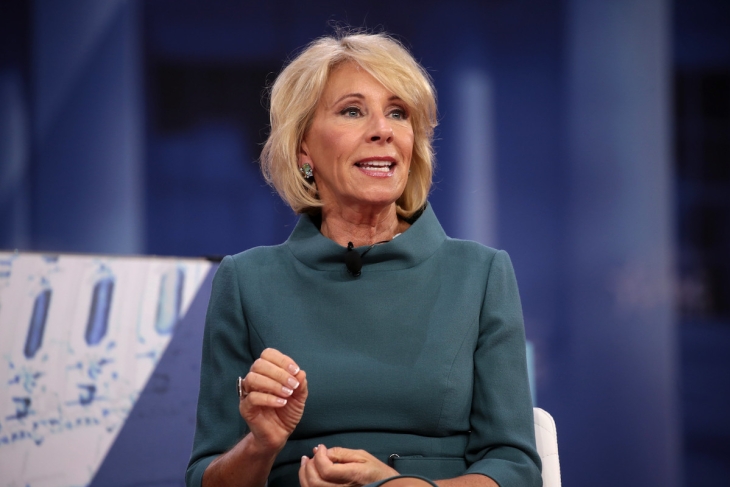As a Never-Trumper who suggested to Secretary DeVos that she resign after the 2018 election, I haven’t exactly been this Administration’s biggest fan. But let me say without equivocation: She has risen to the occasion during the current coronavirus crisis, and for that she deserves praise.
Most critically, she and her team acted swiftly to clarify that federal civil rights and special education laws need not stand in the way of distance learning while schools are closed.
This was no small or easy thing. For decades now, politicians and policymakers across the ideological spectrum have been afraid to do anything to upset special education advocates. All for good reason, to be sure. Children with disabilities are often coping with heart-breaking illnesses and disorders, and in many cases don’t receive the services to which they are entitled. This has turned their parents into ferocious fighters on their behalf, and given them every reason to take a hard, uncompromising position when it comes to the rights of their kids.
Into this buzzsaw walked Secretary DeVos and her team, after the Office for Civil Rights’s original COVID-19 guidance left the impression that districts would be safer not providing any remote instruction at all once schools were closed, lest they invite trouble by not serving their students with disabilities well enough. Once alerted to this problem, the Administration acted with remarkable speed, releasing new guidance just days later imploring schools to move full speed ahead:
[The Office for Civil Rights] and [the Office for Special Education and Rehabilitative Services] must address a serious misunderstanding that has recently circulated within the educational community. As school districts nationwide take necessary steps to protect the health and safety of their students, many are moving to virtual or online education (distance instruction). Some educators, however, have been reluctant to provide any distance instruction because they believe that federal disability law presents insurmountable barriers to remote education. This is simply not true. We remind schools they should not opt to close or decline to provide distance instruction, at the expense of students, to address matters pertaining to services for students with disabilities. Rather, school systems must make local decisions that take into consideration the health, safety, and well-being of all their students and staff.
As Secretary DeVos said in a statement, “This is a time for creativity and an opportunity to pursue as much flexibility as possible so that learning continues. It is a time for all of us to pull together to do what's right for our nation's students.”
Bingo.
This does not—and should not—let public schools off the hook for serving students with disabilities—either during the crisis or afterward. The guidance makes it clear that schools should do the best they can to provide services remotely—and should also provide compensatory services as soon as possible to help kids catch up. It’s also a good idea for them to reach out to parents to set up (video-conferenced) Individualized Education Program meetings, if possible, to discuss the services that will be provided, especially in states where schools will be closed for the remainder of the school year.
And no one can blame parents of special-needs students for doubting that districts will in fact make good faith efforts in implementing the guidance, given that so many districts have failed to serve their children well in normal times. (When this is all over, all of us should put “reforming IDEA” on our to-do lists!)
But these are not normal times. The best we can do is to expect all schools to do the best that they can. And that means moving forward, right away, with distance learning for everyone.
Thank you, Madame Secretary!

